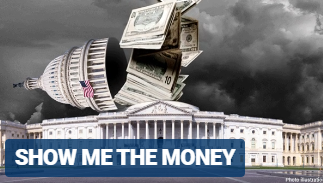In a bold move that sent shockwaves across the globe, President Donald Trump ignited fierce debate and financial tremors last week with the unveiling of sweeping new tariffs—measures he says will ignite an unprecedented economic revival. At the heart of the storm? A jaw-dropping $5 trillion surge in U.S. investment that Trump touts as proof of an “economic revolution” already in motion.
“Stand firm,” the president urged in a defiant post on Saturday, rallying support for the controversial trade strategy. “This won’t be an easy road, but what awaits at the end is history in the making.”
Now entering his twelfth week in office, Trump’s administration finds itself at a critical crossroads. As the dust settles from last week’s announcements, all eyes are on how these seismic policy shifts will shape the immediate future. While Trump promises that these tariffs will supercharge American industry, critics warn they could destabilize markets and punish working families.
Their fears appeared to materialize on Wall Street. The S&P 500 and Nasdaq endured their worst crashes in a decade. The Dow nosedived by over 2,200 points in a single day—a gut punch to investors and a sign of growing unease with Trump’s aggressive trade agenda.
Democratic leaders didn’t mince words. Senator Chuck Schumer labeled the tariffs “a brutal blow to American households,” accusing the White House of catering to the elite while neglecting everyday citizens. “This isn’t a populist policy,” Schumer said during a weekend CNN appearance. “It’s a gift-wrapped package for billionaires.”
But if Trump was rattled, he didn’t show it.
On his social media platform, he doubled down: “We are bringing back jobs and businesses like never before. Over FIVE TRILLION DOLLARS in investments—and that number is only climbing. This is the beginning of something big. We will win.”
As political and economic tensions mount, another key moment looms. Trump is preparing to welcome Israeli Prime Minister Benjamin Netanyahu to the White House—a visit fraught with geopolitical significance. On the table: a 17% tariff imposed on Israel, and the expanding conflict in Gaza, where Israeli forces continue their controversial military operations.
At the same time, Trump’s allies on Capitol Hill are sprinting to advance his massive spending blueprint. The Senate greenlit the president’s ambitious budget framework over the weekend, but the path through the House remains treacherous. Even within the GOP, divisions are deep and patience is wearing thin.
Representative Andy Harris, chair of the House Freedom Caucus, voiced his reservations in a Saturday post: “Until I see the real numbers—how we plan to spend and how we cut—I cannot back the Senate’s version. America First requires fiscal clarity.”
With both global diplomacy and domestic politics hanging in the balance, this week could prove pivotal. Trump’s economic gamble is in full swing. Whether it ends in triumph or turbulence remains to be seen—but for now, the world is watching, and the stakes couldn’t be higher.










